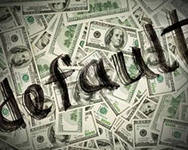U.S.
Congress as of Wednesday morning, the budget has not reached a
compromise and voted to raise the debt "ceiling" that, as the Finance
Ministry warned, threatens the country with technical default since October 17, 2013.

WASHINGTON, Oct. 16 - RIA Novosti, Alexei Bogdanovsky. If something like this happens, the current situation is unprecedented, and its effects are not known precisely. However, there is no doubt that the results will be grim for the U.S. economy. It generates from the markets, politicians and observers hope to reach a compromise in the last hours. When will default?
In the U.S., there is a "ceiling" of government debt, which exceed the
Ministry of Finance may only with the permission of Congress.
The current limit of 16.7 trillion was reached in May, and since then
the Ministry of Finance took over the "extraordinary measures" not to
exceed "ceiling".
Finance Minister Jack Lew said that the ceiling would be exceeded if,
before the expiration of October 17 has been received congressional
authorization for new borrowing.  2013 © AFP / Mandel Ngan 2013 © AFP / Mandel Ngan
Although the absence of a compromise America can not pay its bills this
week, technically the time of default may occur much later. Actually defaulted on the bonds will come when the U.S. will not be able to pay the interest on its debt.
Nearest such payments to be held on October 31, when the U.S. to pay $ 6
billion in the form of interest - this is a relatively small amount. If the United States will make the payment of the foreign debt priority, technical default may not come for weeks. But President Barack Obama said the White House lawyers believe such a prioritization illegal. Obama has also threatened to veto the proposal of the Congress only pay for urgent bills.
In fact, besides the external debt, the U.S. has domestic obligations:
only 1 November will have to pay $ 60 billion to sotsprogrammy, pensions
and wages war. Can suffer many millions of Americans.
Obama also rejected other possible ways out of the situation, in
particular the use of the 14th Amendment to the Constitution, which
states that the U.S. debt "shall not be questioned."
Another exotic option - to resort to the issue of dollars, for example,
to mint a coin denominations of $ 1 trillion, which does not require
parliamentary approval.
However, President Obama believes that his powers do not allow to
bypass Congress, 77 times increased the debt limit, but until now it is
unable to do so because of internal contradictions. What will happen to the American economy?
If the U.S. will not be able to pay any significant part of its debt,
it will cause a sharp rise in interest rates on Treasury bonds at first,
and then for all loans in the United States. Financial markets collapse, and with them will be reduced and assets of Americans. Banks again stop giving loans because of the uncertainty of the situation, or will require a much higher percentage. In this case, a new financial crisis along the lines of 2008, and, perhaps more serious, imminent.
Without the ability to borrow money, the state will have to spend only
what is collected in taxes - according to Congressional Budget Office
estimates, spending cuts amount to 32%.
Investment bank Goldman Sachs has estimated that by the end of
November, forced spending cuts amount to $ 175 billion, or 1% of GDP,
against a background of the current federal budget sequestration.  © REUTERS / James Lawler Duggan © REUTERS / James Lawler Duggan Were there precedents?
Even a temporary inability to pay its debts hit hard by U.S. credit - a
country which is considered one of the safest borrowers in the world.
The United States are proud of their credit history that have always
paid its debts, and the fact that the dollar has never been subjected to
the denomination.
However, in the history of the United States were the two episodes (in
1790 and in 1933), when the government failed to pay its debts in full,
but not defaulted in the technical sense of the term. In both cases, investors in U.S. securities forced to agree to the payment of the debt at a discount.
Another rare historical incident shows that even a minimal delay in the
payment of debt threatens U.S. disproportionately large damage.
In 1979, the United States due to a technical error defaulted on the
bonds for 122 million dollars (this is only one hundred percent of the
total amount of the then $ 800 billion in debt). But the cost of borrowing in the year increased by 0.6%, or $ 6 billion.  © REUTERS / Jonathan Ernst © REUTERS / Jonathan Ernst |
 Main
Main 
 Registration
Registration Login
Login